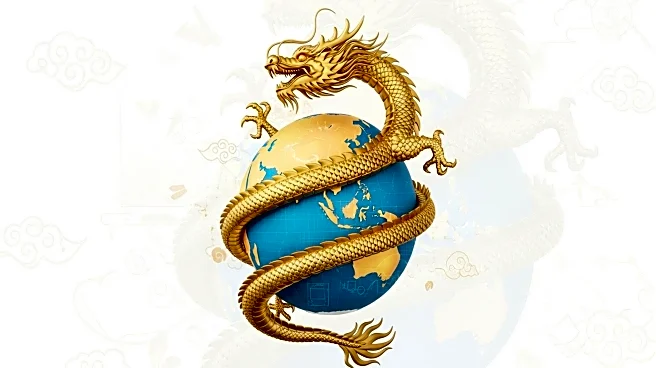What's Happening?
China has solidified its position as the leading external partner in Southeast Asia, surpassing the United States in influence across several countries. According to the Lowy Institute's Southeast Asia Influence Index, China scored 65 out of 100, making it the most influential power in six of the region's 11 countries, including Cambodia, Indonesia, Malaysia, Myanmar, Thailand, and Vietnam. The region is diversifying its partnerships to mitigate risks from the US-China rivalry, yet remains highly exposed to China in sectors like tourism, investment, and trade. China is the region's top export market, accounting for 20% of exports, and is responsible for 26% of imports.
Why It's Important?
China's growing influence in Southeast Asia has significant implications for regional geopolitics and economic dynamics. As countries in the region seek to balance their relationships with major powers, China's dominance could shift trade patterns and investment flows, impacting local economies. The reliance on China for exports and imports highlights the strategic importance of maintaining stable relations with Beijing. This development may also affect the United States' ability to exert influence in the region, potentially altering diplomatic strategies and alliances. The economic interdependence with China could lead to increased political leverage, affecting policy decisions and regional stability.
What's Next?
Southeast Asian countries may continue to diversify their economic partnerships to reduce dependency on China and manage geopolitical tensions. The ongoing rivalry between the US and China could lead to strategic realignments, with countries seeking to balance their interests between the two powers. Future trade agreements and investment initiatives may focus on enhancing regional cooperation and resilience against external pressures. The role of China in regional development projects and infrastructure investments could expand, further solidifying its influence.
Beyond the Headlines
The deepening economic ties with China raise questions about sovereignty and the potential for political influence. The ethical considerations of relying heavily on a single external partner may prompt discussions on sustainable development and equitable growth. The cultural impact of increased Chinese presence in the region could influence local traditions and societal norms, leading to a blending of cultures and potential tensions.









